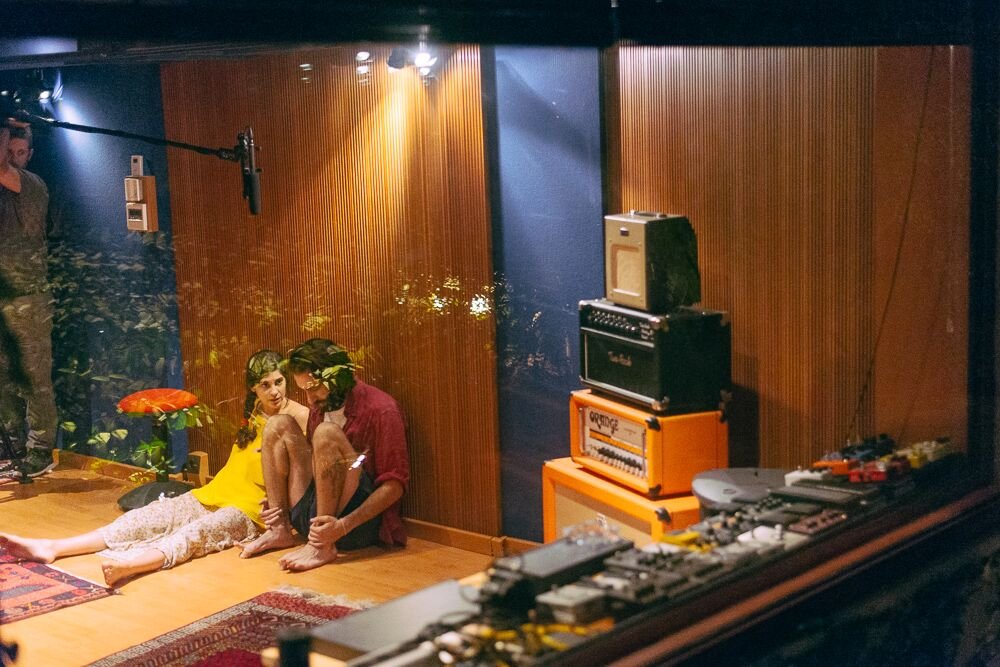The Permanent Crisis of Youth in Afterlov
Afterlov, Stergios Paschos (2016)
In Afterlov, a pair of hands spreads open a floor plan as a male voice-over describes the rooms and their exact position. Very soon, the viewer understands the film's rather disturbing premise: Nikos, the male protagonist, plans to hold his ex-girlfriend in captivity. This is a story that starts with an extreme sense of humor and ends with the bittersweet aftertaste of love—namely, freedom.
Belonging to the recent outburst of the Greek Weird Wave, Stergios Paschos's film employs "performative aesthetics" and maintains themes of enclosure, revenge and gender performativity, completely erasing the theme of family as either a background context for the characters or an explanatory framework for the events. (1) In contact with screwball and rom-com humor, male sensitivity that recalls Romher and reflexive cinematic techniques from the French New Wave like jump-cuts, breaking the fourth wall and unmasking the cinematic mechanism (the boom and clapboard are often visible), Afterlov is a ray of light that cracks into the bleak, deserted and morbid spaces of the Greek New Wave to remind us that youth is always in a state of permanent crisis— economic, personal, emotional. With witty dialogue and constant mumbling, this film also evokes American independent mumblecore insofar as sparse and decontextualized pieces of information construct the characters' past. Who are these people and why did they break up? It seems that this is exactly what Nikos wants to know.
Elvis is Dead, Stergios Paschos (2013)
The characters' background can be found in Paschos' short film Elvis is Dead, wherein Nikos arranges an accidental meeting with Sophia one year after their separation. Paschos's feature film Afterlov is their second "after-love" meeting, only this time Nikos has a plan: he has convinced Sophia to come and spend some days with him in the luxury villa / recording studio of a friend who is on vacation. He is determined to then keep her there until she provides a decent explanation for their break-up.
While waiting for Sophia at the train station, Nikos informs the viewer that they never had the money for a real one-week vacation, only hippie-style short ones. Moreover, a very brief, slow-motion flash-back of him with Sophia provides a clue of what their relationship was like: the couple walks around the Lycabettus Hill, a vast, leafy area with a breathtakingly romantic view of Athens. Lycabettus Hill is one of the very few "luxuries" every Athenian can enjoy for free.
From the introduction and this flashback, the audience can glean that Nikos and Sophia's relationship consisted of two young people studying or with precarious jobs, working when they can, who spend their time walking around Athens. It comes as no surprise when, at the villa, Sophia sees the pool and runs back joyfully to hug Nikos. Was a luxury vacation all they needed to save their relationship?
Soon enough, the plot is confined to the residence which Paschos films in every possible way: inside and outside, in elegant tracking shots, via the camera in a mobile phone and even theatrical mise-en-scène. His insistence on space—equivalent to a filmic insistence on improvising gestures and voices—contextualizes the villa almost as a symbolic locale.
Afterlov, Stergios Paschos (2016)
The luxury dwelling, like the villa and the luxury hotel, in or out of use, appears in several films within the Greek New Wave, notable for these spaces' complexity during the time of Greek crisis. Luxury spaces could be understood as the Bakhtinian chronotope of the Greek New Wave, "the intrinsic connectedness of temporal and spatial relationships."(2) Often "organizing centers for the fundamental narrative events,"(3) these spaces encapsulate in distorted and hidden ways the Greek crisis and mediate its discourses. The villa in Yorgos Lanthimos's Dogtooth, the first sequence house with the empty pool in Argyris Papadimitropoulos's Wasted Youth, the villa of a middle-age man who is soon to collapse economically and mentally in Alexis Alexiou's Wednesday 04:45, and the luxury but off-season hotel in Elina Psykou's The Eternal Return of Antonis Paraskevas all point to a bubble of affluence. In the case of Afterlov, the luxury villa gestures toward the rose-colored and obsolete bubble of cinematic romance.
During the 1990s, villas were the setting of Greek popular comedies, of TV series populated by the "rich and the famous" and of an imaginary life promoted by lifestyle magazines. It is no surprise that in the Greek New Wave, luxury space has been transformed to the locus of enclosure and confinement, of a borrowed life, of an imaginary future. The fact that Afterlov's villa is also the main setting of some films of Nikos Nikolaidis—one of the great auteurs of New Greek Cinema in the 1970s and onwards—registers it as a cinematic capsule that will be known to Greek cinephiles and historiographers. In this villa, like in The Wretches Are Still Singing (Nikos Nikolaidis, 1979), Nikos and Sophia are clowning and blathering, trying to survive (or not) the end of love and the end of youth around the dinner table.
The Wretches Are Still Singing, Nikos Nikolaidis (1979)
If classical cinematic romance leads to the formation of a home, in Afterlov this romance was built on a foundation of false expectations, parallel dreams, mirrors and soundproof windows that prevent the sound of one's voice from reaching the outside word. The inserts of beautiful shots of the garden flora throughout the film, and the film's final natural and simple sex scene, provide the vanishing point of the plot and the only way out of entrapment.
Afterlov, Stergios Paschos (2016)





